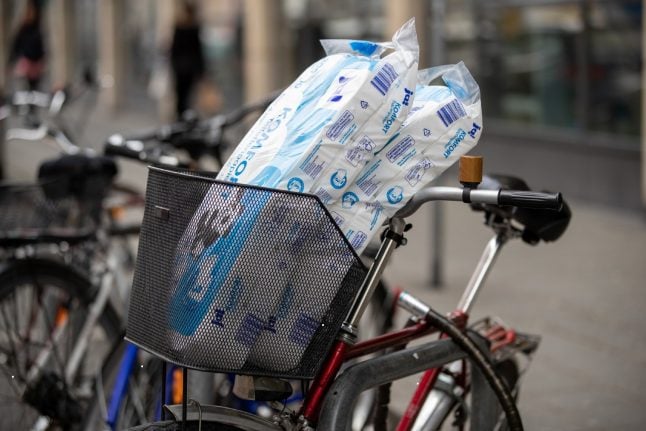When the coronavirus pandemic spread across Europe earlier this year, toilet paper went from being a normal household item to a prized commodity overnight.
As panicked customers rushed to stock up for the imminent lockdown, limits had to be introduced to ration supply and empty shelves were seen in supermarkets across the country.
Estimates by market researchers Iri suggest that the sales of toilet paper in the second week of March more than doubled compared to the same week in 2019.
Uncertainty grows along with cases
By the time summer came around and restrictions were loosened, demand eventually stabilised.
But now that infection rates in Germany are on the rise once more, it seems that fears of a second lockdown are driving customers back to the hygiene aisle for another Hamsterkauf (panic buying).
READ ALSO: Germany reports 6,638 new coronavirus cases – highest since start of pandemic
“At the moment we are noticing another slight increase in demand for certain products such as toilet paper in our stores”, a spokesman for discount Aldi Süd told German magazine WirtschaftsWoche.
Lidl too confirmed it was experiencing an increase in demand, but chains such as Rewe, dm and Kaufland have not yet noticed a change.
Many Germans have taken to Twitter to either complain or make fun of the shortages, with one joking about finding a ‘Hamster Kauf Starter Pack’ in his local supermarket, or several rolls of toilet paper and flour:
Supermarktfund: Hamsterkauf-Starter-Pack pic.twitter.com/HoOTMA45Oz
— Lars Weiler (@DC4LW) October 14, 2020
An Edeka store in the southern town of Esslinger has even taken to TikTok to ask customers to shop responsibly:
Nicht schon wieder, bitte haushaltsübliche Mengen ; ) #edeka #edekaesslinger #tiktok #klopapier #toilettenpapier pic.twitter.com/hmLrWeM1jg
— Edeka Esslinger (@EdekaEsslinger) October 15, 2020
Lessons learned
Despite reports of empty shelves, however, the two discount retailers stressed that panic-buying was by no means necessary.
“After the events we saw earlier this year, we are monitoring changes in demand more closely than ever to ensure that nothing is in short supply”, said the spokesperson for Aldi Süd.
Lidl also confirmed that it was “well prepared”, adding that it was in a position to “react quickly to provide stores with sufficient supplies” if demand should increase.



 Please whitelist us to continue reading.
Please whitelist us to continue reading.
Member comments